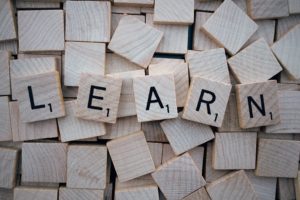Learning Lessons

(This essay is, in part, modified from a speech I gave to the SMU Lions Club in 1997.)
Over the years I have learned many things, in many ways, and from many people. I learned a great deal about being an effective university administrator from Ron Brown, a former Vice President for Student Affairs at UT-Austin. Some of the lessons I learned were difficult ones, but on the lighter side, he taught me:
- “No matter how bad your job is, someone else wants it.”
- “The number of people watching you is in direct proportion to the stupidity of your action.”
- “If something goes wrong with a student’s file, (he started in Financial Aid), no matter how hard you try, it will keep getting worse,” and the immortal,
- “The bigger they are, the harder they hit.”
I’ve learned from classes, workshops, and colleagues, but not surprisingly, I’ve learned the most about doing my job from students.
After an international student was stopped at a the DFW airport with phony travel papers, a university ID, two changes of clothing, and 75 books from the university library, he was deported. We put a judicial hold on his records because of the theft. From him I learned to keep good records. No matter how unlikely it seems at the time, students come back.(And yes, he came back.)
While investigating an accusation that a student had someone take a placement course for him we became suspicious about the correspondence course he was taking. He was turning in courses at a highly accelerated pace. Sure enough, he sent in someone else to take the final exam at the testing center. I learned never underestimate the audacity of a student whose parents already have plane tickets for graduation weekend.
From students who were perpetrators or victims and from all of the hazing cases I’ve investigated, I’ve learned the power of the need to belong.
Over the years, I’ve worked with faculty to figure out ways for a blind student to study Russian, I’ve seen a deaf student teach a mainstream art class, and I’ve watched a student with severe cerebral palsy graduate from law school. (And now practice law.) From these students, and many more, I’ve learned you don’t have to be able to see to understand, to be able to speak to be a good communicator or to hear to be able to teach.
I’ve learned how fragile human life really is – how little alcohol is really needed for someone to die of alcohol poisoning and how a small miscalculation can result in death and destruction.
I’ve also learned how little it takes to bring joy to someone’s life and how important support from others truly is.
The invitation from the Lions’ Club was for a light-hearted after-dinner speech. But I had spent the day responding to the death by suicide of a first-year student. I knew then, as I know now, that we would never know the reasons for our student’s action. As in so much of our work, it is not for us to know. It is only for us to do the best we can for our community in the aftermath.
We’re now a year into our experience of life during a pandemic. In a couple of weeks, we’ll mark the day when it all became real for many of us and we’ve already crossed a previously unimaginable number of deaths. There are many lessons we have all learned over this past year. But I’ll close today with the same lessons I referenced more than twenty years ago because I think they are still important to remember and to practice:
- take time to appreciate all that you have,
- take time to appreciate the people around you,
- ask for help when you need it
- give help when you can.
Take care,
Gage

mybook.to/SustainingLeadership
